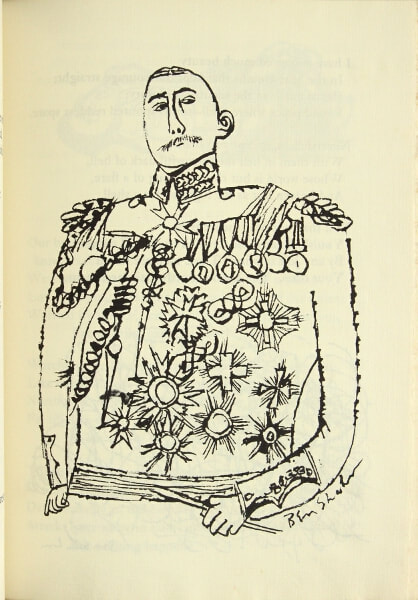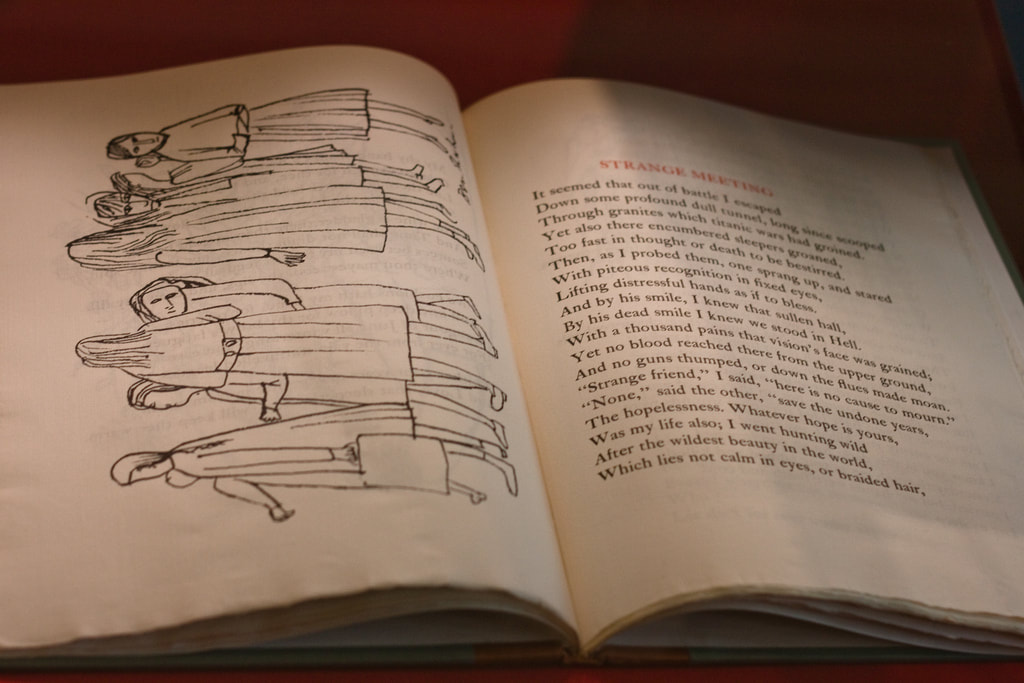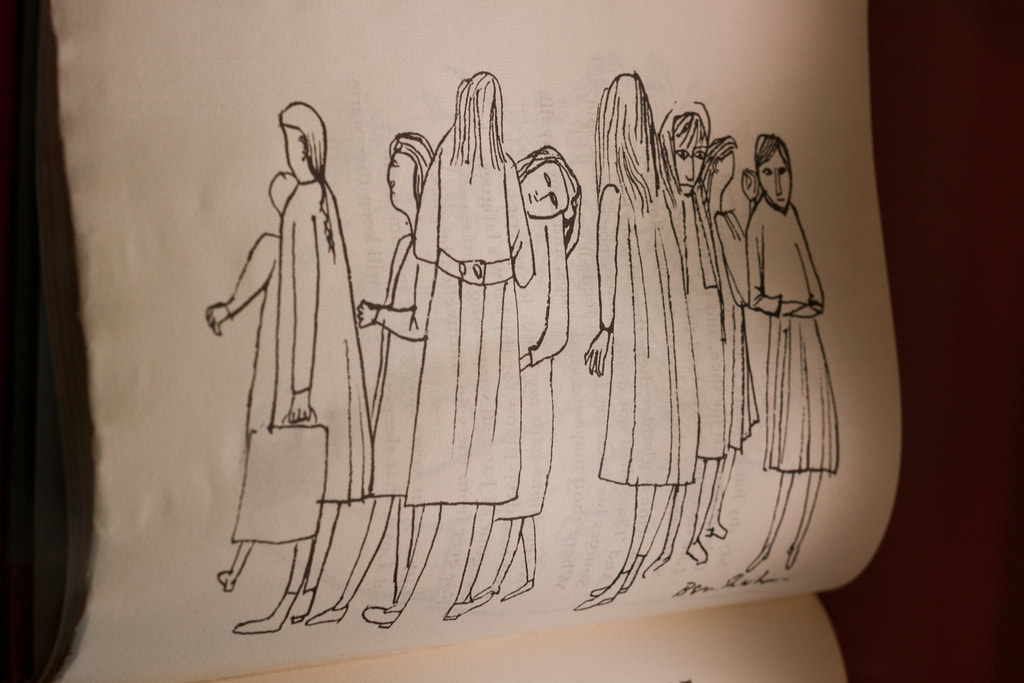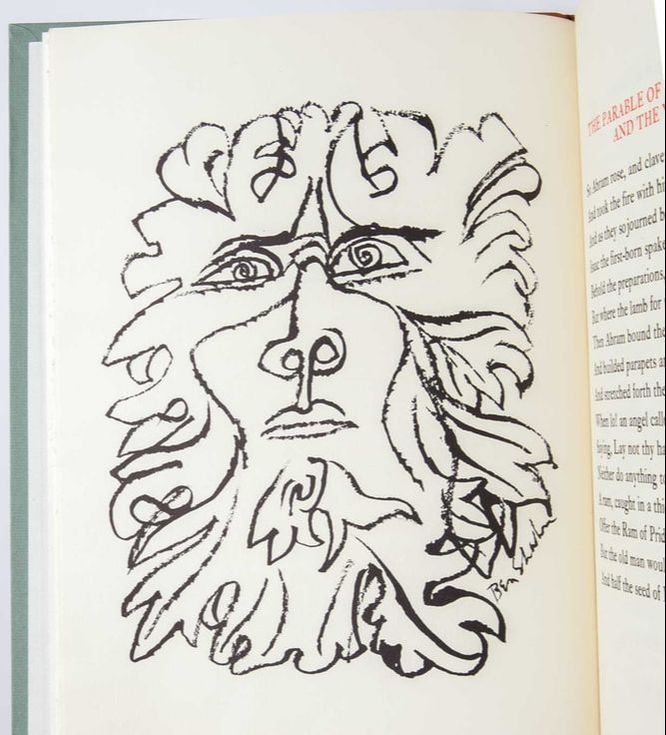|
Apologia Pro Poemate Meo
(by Wilfred Owen) I, too, saw God through mud— The mud that cracked on cheeks when wretches smiled. War brought more glory to their eyes than blood, And gave their laughs more glee than shakes a child. Merry it was to laugh there— Where death becomes absurd and life absurder. For power was on us as we slashed bones bare Not to feel sickness or remorse of murder. I, too, have dropped off fear— Behind the barrage, dead as my platoon, And sailed my spirit surging, light and clear, Past the entanglement where hopes lie strewn; And witnessed exultation— Faces that used to curse me, scowl for scowl, Shine and lift up with passion of oblation, Seraphic for an hour, though they were foul. I have made fellowships— Untold of happy lovers in old song. For love is not the binding of fair lips With the soft silk of eyes that look and long. By joy, whose ribbon slips,— But wound with war's hard wire whose stakes are strong; Bound with the bandage of the arm that drips; Knit in the welding of the rifle-thong. I have perceived much beauty In the hoarse oaths that kept our courage straight; Heard music in the silentness of duty; Found peace where shell-storms spouted reddest spate. Nevertheless, except you share With them in hell the sorrowful dark of hell, Whose world is but a trembling of a flare And heaven but a highway for a shell, You shall not hear their mirth: You shall not come to think them well content By any jest of mine. These men are worth Your tears: You are not worth their merriment. |
|
Strange Meeting
(by Wilfred Owen) It seemed that out of battle I escaped Down some profound dull tunnel, long since scooped Through granites which titanic wars had groined. Yet also there encumbered sleepers groaned, Too fast in thought or death to be bestirred. Then, as I probed them, one sprang up, and stared With piteous recognition in fixed eyes, Lifting distressful hands, as if to bless. And by his smile, I knew that sullen hall,— By his dead smile I knew we stood in Hell. With a thousand fears that vision's face was grained; Yet no blood reached there from the upper ground, And no guns thumped, or down the flues made moan. “Strange friend,” I said, “here is no cause to mourn.” “None,” said that other, “save the undone years, The hopelessness. Whatever hope is yours, Was my life also; I went hunting wild After the wildest beauty in the world, Which lies not calm in eyes, or braided hair, But mocks the steady running of the hour, And if it grieves, grieves richlier than here. For by my glee might many men have laughed, And of my weeping something had been left, Which must die now. I mean the truth untold, The pity of war, the pity war distilled. Now men will go content with what we spoiled. Or, discontent, boil bloody, and be spilled. They will be swift with swiftness of the tigress. None will break ranks, though nations trek from progress. Courage was mine, and I had mystery; Wisdom was mine, and I had mastery: To miss the march of this retreating world Into vain citadels that are not walled. Then, when much blood had clogged their chariot-wheels, I would go up and wash them from sweet wells, Even with truths that lie too deep for taint. I would have poured my spirit without stint But not through wounds; not on the cess of war. Foreheads of men have bled where no wounds were. “I am the enemy you killed, my friend. I knew you in this dark: for so you frowned Yesterday through me as you jabbed and killed. I parried; but my hands were loath and cold. Let us sleep now. . . .” |
|
The Parable of the Old Man and the Young
(by Wilfred Owen) So Abram rose, and clave the wood, and went, And took the fire with him, and a knife. And as they sojourned both of them together, Isaac the first-born spake and said, My Father, Behold the preparations, fire and iron, But where the lamb for this burnt-offering? Then Abram bound the youth with belts and straps, and builded parapets and trenches there, And stretchèd forth the knife to slay his son. When lo! an angel called him out of heaven, Saying, Lay not thy hand upon the lad, Neither do anything to him. Behold, A ram, caught in a thicket by its horns; Offer the Ram of Pride instead of him. But the old man would not so, but slew his son, And half the seed of Europe, one by one. |




